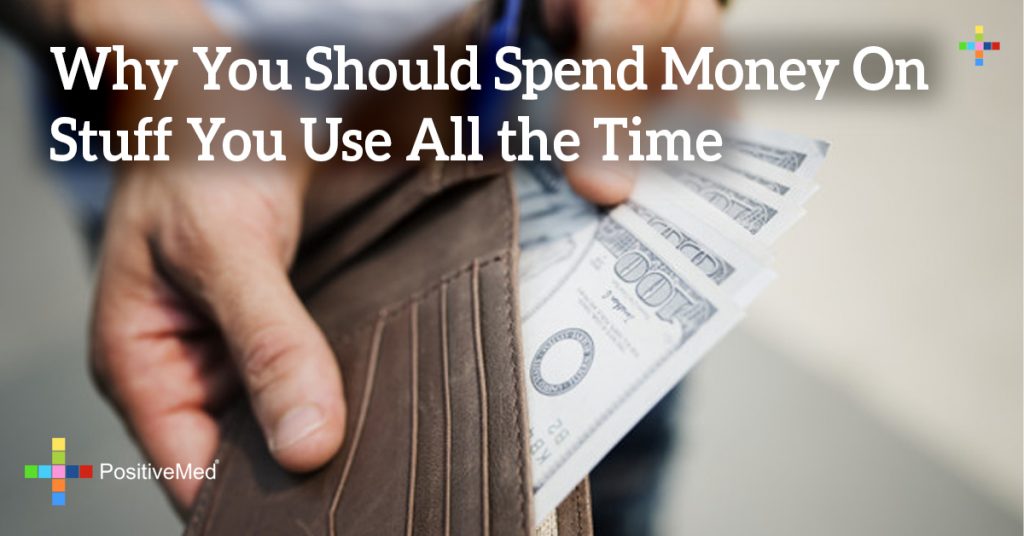
Why You Should Spend Money On Stuff You Use All the Time
I abide by a few simple rules that contribute greatly to my daily happiness.
For example, “Go left.”
Instead of debating which line to stand in at the airport or grocery store, I simply choose the one that is furthest to the left. Then I refuse to stress over it, no matter how fast the other lines move.
Which brings me to the Viridian Manifesto, championed by sci-fi author Bruce Sterling.
Maybe you’re the type of person who spends money easily, without concerns for budgetary constraints, eco-impact, or post-purchase guilt. Or perhaps you’re the opposite: extremely frugal, on board with the simplicity movement, and never tempted to buy anything. But chances are, like me, you’re somewhere in the middle. If so, this rule is for you.

Let me start with an example. Urban legend holds that French women have tiny wardrobes. They spend a good deal of money on the staples: One elegant skirt; one sharp-fitting blazer; one pair each of slacks and jeans; one fine purse; one set of heels. All black, naturally. The rest, they buy at Forever 21 or the French equivalent, Naf Naf: tops, t-shirts, bathing suits, trendy sandals, etc.
When I first came upon this philosophy while living in Paris in 2002, it made so much sense. Then, a few years later, my brother Derek sent me a long article entitled The Last Viridian Note. In it, Bruce Sterling argued that many of the objects you spend money on “can damage you personally. The hours you waste stumbling over your piled debris, picking, washing, storing, re-storing, those are hours and spaces that you will never get back in a mortal lifetime … Every moment you devote to them is lost to your children, your friends, your society, yourself.”
On the other hand, Sterling pointed out:
“The items that you use incessantly, the items you employ every day: these are the critical ones …. The everyday object is the monarch of all objects. It’s in your time most, it’s in your space most.”
In other words, we ought to skip Forever 21 altogether. But we should invest in objects that live with us: a phone, a computer, a pair of yoga pants that we wear five times a week. And beyond that, we should spend on items we rely on heavily: a bed, a toilet, a dishwasher. Anything else, try to avoid purchasing. If we already have it, get rid of it.
Ever since, I’ve made an attempt to stick to the Viridian Manifesto in my own life. Three years ago, when moving to LA to marry the love of my life Kiran, for instance, we debated which mattress to purchase. Neither of us had much in the way of savings at the time, yet we chose the Tempurpedic. At $3,000, it seemed outrageously expensive. But several friends and even his doctor said it would be the super comfortable and therapeutic for his bad back.
I asked myself: Is this something we’d be using every day? Absolutely. In fact, we’d be spending roughly one third of our lives on this mattress. What could be more worthy of a big spend? I’ve never regretted the purchase.
At the same time, the Viridian Manifesto councils us to cut back on unnecessary expenditures—and I take this part seriously, too. Recently, I wandered into Zara with a bunch of college girlfriends. They each bought several items. I resisted. And it felt great.
So the next time you’re considering a purchase, ask yourself these questions: (1) Do I really need it? (2) How often will I use it? (3) How much will it impact my daily enjoyment of life?
If the item is necessary, you’ll use it every single day (or close to), and it has a genuine impact on your happiness, then consider investing in the pricier option. Otherwise, think about the environmental impact of buying frivolous stuff that drains our planet’s limited resources. Consider the sociological impact on the overseas workers who created it for meager wages. And walk away.
It’s a simple recipe for greater happiness that’s good for you and for the world.
About the Author
 MeiMei Fox
MeiMei Fox
MeiMei Fox is the published author, co-author, ghostwriter and freelance editor of numerous non-fiction health, wellness, spirituality and psychology books, magazine articles and blogs, including New York Times bestsellers Bend, Not Break and Fortytude. She has edited a book by His Holiness the Dalai Lama and was Expedition Writer for Alexandra Cousteau’s 2009 Expedition: Blue Planet. Currently, she is penning a YA sci-fi/fantasy trilogy with her husband Kiran Ramchandran.
In addition to writing, MeiMei works as a life coach, assisting her clients in realizing their most ambitious dreams.She graduated Phi Beta Kappa with honors and distinction from Stanford University with a BA and MA in psychology. She also holds an MA in counseling psychology from Pacifica Graduate Institute, and is a certified yoga instructor. She sits on the board of HOPE Foundation, an NGO dedicated to helping street kids in Calcutta, India. Her mantra is: Fear Less, Love More!





